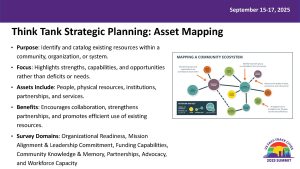Leveraging Resources: Houston’s Path to Sustainable HIV Responses
Blog Post by Dr. José M. Zuniga
At the US Fast-Track Cities 2025 Summit in New Orleans, Marlene McNeese, Deputy Assistant Director of the Bureau of HIV/STI and Viral Hepatitis Prevention at the Houston Health Department, delivered a powerful plenary session on how Houston and Harris County are forging sustainable pathways to end the HIV epidemic.
Her plenary presentation during the closing panel of the 2.5-day Summit, “Leveraging Our Collective Resources: Houston/Harris County Think Tank Strategies for Sustainability,” underscored the importance of collaboration, innovation, and long-term planning in one of the most diverse and populous regions of the United States.
Houston’s metropolitan statistical area (MSA), eligible metropolitan area (EMA), and health service delivery area (HSDA) span more than 10,000 square miles – 3.5% of Texas’ total geography. Home to over 7.8 million residents, the region is marked by extraordinary diversity: nearly 69% of the population are racial and ethnic minorities, with Hispanic residents making up 42% and Black/African American residents 20%. Importantly, one in four residents is foreign-born. This demographic reality brings unique strengths but also highlights inequities that must be addressed in health systems design and delivery
McNeese emphasized Houston/Harris County’s long-standing commitment to integrated planning, which began in 2011 – six years before joint planning became a federal requirement under HRSA and CDC. The first integrated plan was released in 2012, followed by subsequent updates, including the 2022-2026 iteration. This legacy of proactive alignment across systems has laid the groundwork for more resilient and adaptive public health responses
At the heart of Houston’s sustainability efforts is its Think Tank Strategic Planning Series, a model of multi-sector engagement designed to elevate local voices, align priorities, and generate actionable strategies. The convenings have become trusted spaces for dialogue and policy advancement.
A highlight of this process was the May 2025 “Friends in High Places” policy meeting, hosted by LOUD Inc. at the County Commissioner’s office. This event brought community voices directly into policy spaces, raising awareness about public health funding challenges while also catalyzing consensus around a unified one-page impact statement for decision-makers.

A centerpiece of McNeese’s plenary was Houston’s Asset Mapping Project. Unlike traditional needs assessments that often spotlight deficits, asset mapping emphasizes strengths: people, physical resources, institutions, partnerships, and services. Phase 1, now complete, identified the breadth of existing capacities in Houston’s HIV ecosystem.
The benefits are far-reaching. Asset mapping encourages collaboration, strengthens partnerships, and promotes efficiency by helping stakeholders see the full picture of resources at their disposal. Survey domains included organizational readiness, mission alignment, leadership commitment, funding capacity, and workforce strength, among others.
McNeese outlined ambitious next steps that build upon this foundation. Phase 2 of asset mapping will broaden collaboration to include mental health, substance use, and regional healthcare organizations. Narrative training programs are being developed with Center for AIDS Research (CFAR) leaders to enhance advocacy. A unified communication platform is under review to streamline coordination, and a rapid response plan is in draft, positioning Houston/Harris County to react swiftly to future challenges
Houston’s experience offers lessons for other Fast-Track Cities across the United States: sustained impact requires intentional collaboration, leveraging community strengths, and ensuring that local voices shape both policy and practice. By reframing deficits into assets, Houston is not only addressing today’s challenges but also investing in a more resilient public health system for tomorrow.
As McNeese concluded, the collective resources of Houston and Harris County – its people, institutions, and partnerships – are the key to sustainability. In a time of political and financial headwinds, this approach represents both a model and a call to action for cities nationwide.
Dr. Jose M. Zuniga is President/CEO of IAPAC and the Fast-Track Cities Institute.





